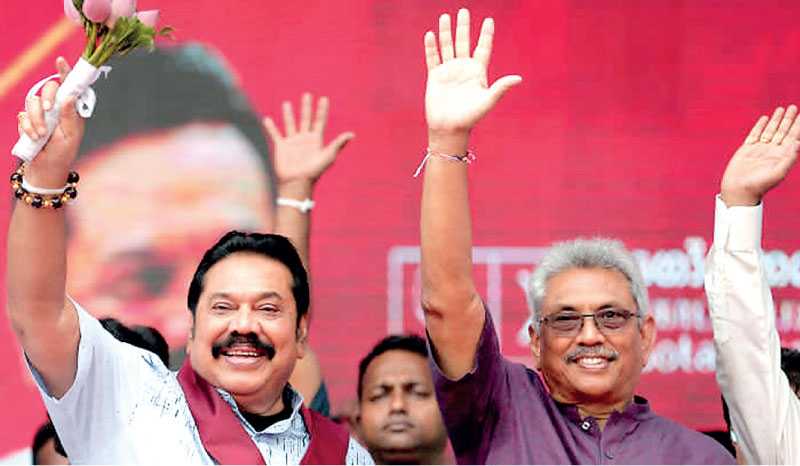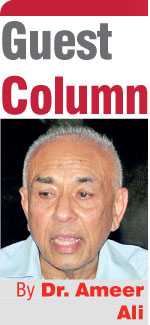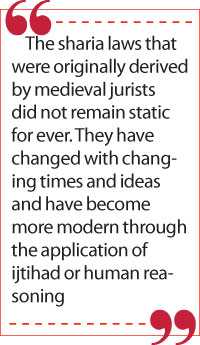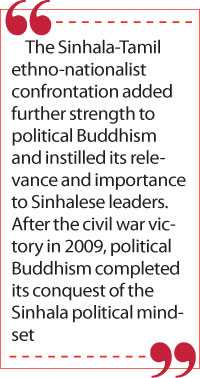Wednesday Mar 04, 2026
Wednesday Mar 04, 2026
Monday, 29 March 2021 00:00 - - {{hitsCtrl.values.hits}}

As political Buddhism strengthened its hold on national governance since 1950s political liberalism with its liberal democracy began to be weakened, and the supremacy of the former was stamped without any doubt at the two elections, one held for the presidency in November 2019 and the other to the Parliament in February 2020
 The recent verbal encounter between a Government minister, who asked those who want to live under sharia laws to go to Saudi Arabia, and a former Muslim Governor of Western Province, who refuted the minister and maintained that one could live under sharia laws in Sri Lanka, which eventually ended in Police arresting the ex-Governor under the Prevention of Terrorism Act, illustrates how deeply and widely has political Buddhism penetrated the realm of national governance and, under the so-called one country one law (OCOL) mantra, imposes its own metaphysics on minority communities.
The recent verbal encounter between a Government minister, who asked those who want to live under sharia laws to go to Saudi Arabia, and a former Muslim Governor of Western Province, who refuted the minister and maintained that one could live under sharia laws in Sri Lanka, which eventually ended in Police arresting the ex-Governor under the Prevention of Terrorism Act, illustrates how deeply and widely has political Buddhism penetrated the realm of national governance and, under the so-called one country one law (OCOL) mantra, imposes its own metaphysics on minority communities.
This is an alarming trend, which no one wants to discuss in public, and which threatens not only to destroy the very fabric of Sri Lanka’s religious and cultural pluralism, but also signals the end of what John Rawls described as political liberalism with its “political conception of justice” and “overlapping consensus”.
Political conception of justice produces fairness and overlapping consensus brings stability. In Rawls’ words: “Such a consensus consists of all the reasonable opposing religious, philosophical, and moral doctrines likely to persist over generations and to gain a sizeable body of adherents in a more or less just constitutional regime, a regime in which the criterion of justice is that political conception itself.” (John Rawls, Political Liberalism, New York: Columbia University Press, 1993, p. 15).
Origin of political Buddhism
Political Buddhism is a 20th century avatar, although its seeds were sown in the 19th. It came into prominence during the very first Parliamentary Elections held under the Soulbury Constitution in 1947, when a group of Buddhist priests from Vidyalankara Privena appeared on election platforms to canvass support for political parties of the left.
These political bikkus, a term coined by Walpola Rahula Thera and political Buddhism they promoted are obviously foreign to the original teachings of the Buddha, who eschewed politics completely. From the 1950s however, political Buddhism spread its influence and became a crucial element in deciding the outcomes of national political contests.
The Sinhala-Tamil ethno-nationalist confrontation added further strength to political Buddhism and instilled its relevance and importance to Sinhalese leaders. After the civil war victory in 2009, political Buddhism completed its conquest of the Sinhala political mindset. Its ultimate target is to make Sri Lanka a Buddhist State in all its dimensions.
Although political liberalism with a constitutional structure was a gift by the British, the spirit of political liberalism preceded the colonial era. The political conception of justice that prevailed during the medieval period was also a product of Buddhist virtuosity infused into governance by members of the Sangha.
It was that Buddhism mixed liberalism, which produced justice and fairness which in turn brought an overlapping consensus between the ruling regime and plural entities of Sri Lankan society. That spirit of political liberalism was interrupted under colonialism until the British introduced liberal democracy on the eve of independence.
As political Buddhism strengthened its hold on national governance since 1950s political liberalism with its liberal democracy began to be weakened, and the supremacy of the former was stamped without any doubt at the two elections, one held for the presidency in November 2019 and the other to the Parliament in February 2020.
 Political Buddhism at present
Political Buddhism at present
Today, Buddhist supremacists are in total control of all spheres of governance. Between the ascendancy of political Buddhism and retreat of political liberalism the overlapping consensus that existed between liberal governance and Islam started evaporating. The episode referred to at the beginning illustrated that evaporation.
Similarly, the same minister’s announcement to ban the burqa and niqab, which is still to be discussed in the Cabinet, the resolve to close down around 1,000 Quranic schools, to disallow the import of books on Islam believed to have been authored by radical writers, and to open rehabilitation centres to re-educate suspected Muslim extremists – all in the name of fighting Islamic extremism, is the unfortunate outcome of the progressive retreat of political liberalism and evaporation of that overlapping consensus.
Sharia law
To end this brief note, the issue of sharia laws and their history in this country, deserves some comment. The so-called sharia laws were drawn and compiled by Muslims, for Muslims and when Muslims were in power. Therefore, there is guidance in sharia as to how a Muslim ruler or a Muslim Government should treat non-Muslims living under their rule, but hardly is there any guidance as to how Muslims should live as a minority under non-Muslim jurisdictions.
Also, the sharia laws that were originally derived by medieval jurists did not remain static for ever. They have changed with changing times and ideas and have become more modern through the application of ijtihad or human reasoning. 
Even today, through the same process, Muslim scholars are working on an ongoing project called Fiqh al-Aqalliat or Islamic laws for Muslim minorities, which originally began in 1990s. This project is not intended to isolate Muslim minorities and encourage them to live in ghettos governed by religious laws, but essentially to integrate them with the majority and create that overlapping consensus between sharia and liberal democratic values.
Andrew March, a political scientist from Yale University and an expert on Islamic political thought, has gone deeply into the issue of overlapping consensus between political liberalism and changes in the interpretation of sharia laws and found that the inter-accommodative capacity between the two is quite spacious, which enables them to coexist without much conflict (See, Andrew March, Islam and Liberal Citizenship: The Search for an Overlapping Consensus, Oxford University Press, 2009).
“Islam would prefer to be expressed through a community”, says March, “where politics and metaphysics are fused” (p. 272), as was under Buddhist monarchs of yore; but he also warns that “were non-Muslim states to make wider claims to metaphysical truth, then it might be more difficult for Muslims to affirm citizenship within them” (Ibid).
It is this claim in Sri Lanka emanating from political Buddhism and asserted by leaders of the current regime that is causing problems with the Muslim minority. To the Muslims, the Quran is explicit in commanding them to “obey Allah, and obey the Messenger, and those charged with authority among you” (Q: 4-59).
Yusuf Ali, in commenting on “those charged with authority among you”, notes that “As Islam makes no sharp division between sacred and secular affairs, it expects governments to be imbued with righteousness. Likewise, Islam expects Muslims to respect the authority of such governments for otherwise there can be no order or discipline”.
It was this righteousness that prevailed from medieval times until recently that kept the equilibrium between Muslim allegiance to national governments and their freedom to conduct their personal life according to sharia. The Muslim Marriage and Divorce is the best illustration of this equilibrium.
Of course, it needed reforms to keep pace with changing times and values of Muslim society, and that was why the Justice Marsoof Committee was appointed more than ten years ago to propose suitable changes.
But to call for total abolition of Muslim personal laws under OCOL mantra is travesty of justice to satisfy the demands of Buddhist supremacists. Muslims were at peace when Buddhism infused virtuosity in governance, and they are in trouble, because political Buddhism infuses bellicosity.
Thus, it is the evaporation of that overlapping consensus caused by the erosion of liberal democratic values that is causing conflicts between Muslims and a regime beholden to political Buddhism. OCOL, endorsed by the President, his Viyathmaga and political bikkus, goes against every grain of Sri Lanka’s inherited heterogeneity and plunders the human rights of minorities.
The forced cremation of COVID-19 Muslim dead was a classic example of this encroachment. UNHCR was quite right in picking up this issue as one of the charges against the regime. Unless the political structure becomes more liberal and democratic, stability would be the order of the day. It is unfortunate that even parties in the Opposition do not want to distance themselves from political Buddhism.
(The writer is from the School of Business and Governance in Murdoch University, Western Australia.)